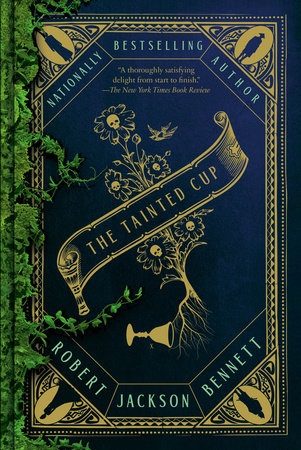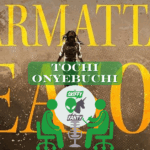Even though it wasn’t quite the book I’d been expecting, I found Robert Jackson Bennett’s The Tainted Cup (2024) to be a solid read, entertaining and intriguing. It wasn’t much like “a Nero Wolfe mystery in a fantasy setting” (as I’d seen it described) to my way of thinking, and it didn’t blow my mind like City of Stairs, the first of Bennett’s books that I’d read. But I like the protagonist, the worldbuilding becomes increasingly interesting, and the complicated plot has a very satisfying resolution, while leaving me eager for more.
I’ve read at least two dozen of the Nero Wolfe mysteries by Rex Stout. They feature a reasonably skilled detective who goes out to observe things and conduct interviews and then reports back to his eccentric genius work-from-home boss, who has his own chef and an entire floor devoted to raising orchids. They are fun period puzzles, especially the earlier ones, if you can overlook the male gaze of the narrator, the assistant detective Archie Goodwin (and if you can get past Goodwin’s anti-Hispanic comments in the first book in the series, which aren’t repeated later IIRC). Goodwin is a worldly ladies’ man who is confident of his abilities, including a superb memory, and doesn’t hesitate to mouth off when dealing with bull-headed police.
Dinios Kol, the first-person narrator of The Tainted Cup, is neither a ladies’ man nor a man-about-town. He’s the nervous new assistant to Investigator Anagosa Dolabra, by virtue of having aced a specialized exam despite doing badly in most of his other recent studies. He does have a magically enhanced memory that lets him report back to his mentor, who usually stays in her own quarters and blindfolds herself when outside, in order to avoid overstimulation. But Kol is extremely lacking in self-confidence, being new and concealing a dirty secret or two. So, tonally, this book is quite different from a Nero Wolfe mystery, although the underlying structure is similar (leaving aside the fantasy elements).
Numerous people in this world have received magical enhancements, mental and/or physical. Most of these are granted and imbued due to service to the Empire, which strives to protect its subjects from catastrophic incursions by leviathans and contagions from mutated flora.

After a man is found dead due to a huge plant having suddenly sprouted from within his body, the investigator and her assistant quickly determine that this is no ordinary, accidental contagion. Their investigation and other events take them from a small frontier town to a metropolis full of factions and intrigues, from jurisdictional disputes to economic entanglements, as more deaths are discovered and a conspiracy unfolds that threatens the Empire itself.
Dinios Kol is an appealing protagonist. He’s loyal to his boss and to his relatives, who remain offstage but to whom he regularly sends most of his pay, so they can afford to escape the endangered coast for leviathan-free inland; he’s unsophisticated but perceptive; he’s brave, self-controlled, outwardly stolid, and lonely.
Ana Dolabra is brilliant, and her eccentricities have reasons; she is sharp-tongued, but her manners are blunt, which may explain why she’s been posted to the outskirts of the Empire. She tries to protect Kol, as he tries to look out for her; by the end of the book, they are not exactly friends, but they are definitely a team, with a deeper understanding of each other.
There are many other interesting characters in the book, from a Legion captain, to a snobby noblewoman, to some colleagues who help the investigators, one of whom teaches some dirty sword tricks to Kol. Bennett draws them distinctly. The language here is vivid and expressive, but rarely lyrical; characters occasionally quote aphorisms about duty and service to each other, but that’s about as poetic as it gets.
I’d really like to discuss how the Empire works, including commoners, soldiers, and enhanced Sublimes, with bureaucracy and noble families, all the way to the top, but to do so fully would give away important spoilers for the motivations behind the murders. But, readers, rest assured that Bennett didn’t set up an Empire just because monarchy is an easy go-to for fantasy settings. He has put a lot of thought into how this whole system works, and who benefits, and what some of the weak points are for this apparently strong system.
The Empire is only part of the worldbuilding, of course. We learn about magical enhancements, but flora and fauna hold many mysteries. The leviathans that come from the sea and lay waste to cities are dangerous forces of nature, but Bennett obviously has plans to reveal more about them. The full title of this book is The Tainted Cup: Shadow of the Leviathan: Book 1. That, along with some hints in the text and the fascinating worldbuilding I’ve seen before from Bennett in his Divine Cities trilogy, makes me sure that future books will tell more about what the leviathans are and what drives them.
Other things I hope to see from future books in this setting include Kol gaining more confidence and skills, and maybe meeting some of his family; more fascinating insights, deductions, and machinations from Ana; possible continuing fallout from some enemies made in this book; journeys to other parts of the Empire (including the capital, please); and hopefully, eventually, more of that slow-burn-blink-and-you’ll-miss-it connection that Kol made. But this book definitely stands tall on its own even without any sequels.
Content warnings: Gruesome killings, violence, conspiracies, economic and environmental devastation.
Comps: None occurred to me. If you know any other books combining kaijus and crime, let me know!
Disclaimers: None. Please support your local libraries!







